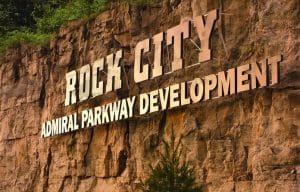Columbia evaluating parks system
Columbia Director of Community Development Scott Dunakey last Tuesday outlined the role of the Columbia Parks and Recreation Advisory Board in the city’s upcoming comprehensive plan process.
The comprehensive plan will be a year-long study analyzing the current state of the city and gathering public input to guide “visions, goals and policy” regarding Columbia’s growth for the next 20 years.
Despite a quorum not being present to establish an official meeting, Dunakey was able to informally discuss the board’s scope of involvement as one of the main components of the plan.
Dunakey pointed out he and other city staff involved in finding a consulting firm to help implement the plan process specifically looked for people who had “expertise” regarding recreation programs and park planning. He noted the board has a history of being in “reactionary mode” and the guidance from the comprehensive plan will allow the board to be more proactive with its decision-making process.
Shockey Consulting was approved by the Columbia City Council to assist with developing the comprehensive plan and provide GIS services. Part of the decision to use Shockey as the consulting group was its high rating in “land use planning” and “parks and recreation planning” qualifications and experience.
The Columbia City Council is expected to finalize a contract with Shockey Consulting on Sept. 7. Once the contract is official, the city will begin its year-long plan creation.
The City of Columbia does not have its own autonomous parks department. Instead, it relies on the park board to make recommendations to the city council for approval of specific park-related actions.
Dunakey told board members in attendance that they would act as a steering committee for the Columbia City Council during the comprehensive plan process to make recommendations for future parks and recreation plans in the city.
After information is gathered during the plan, the goal of the board is to produce “final deliverables” to the council that act as “mini master plans with individual utility” regarding specific park projects.
The first step in preparing for the future is to determine what the present looks like. The board will be tasked with taking an inventory of current equipment and amenities offered in Columbia parks and will gather other information, under guidance of consultants.
The board will also work with the consultants to analyze the city’s recreational options and how they align with “trends from peer cities” in an effort to “meet community needs and increase overall quality of life in Columbia.”
Community engagement will play a “tremendous role” in development of the upcoming comprehensive plan for the city, Dunakey said.
The city has already begun designing tools using the online engagement platform Engagement HQ to maximize residents’ involvement in the plan.
The software will allow moderated forums, mapping feedback, time lines, integrated survey tools and other functions and will be linked through the City of Columbia website.
The city will also seek input through a number of in-person avenues as well.
The first public interaction as part of gathering input for the plan will be during the upcoming Songs4Soldiers concerts Sept. 17-18 at Bolm-Schuhkraft Park.
Dunakey noted that while this event will bring residents of other cities to Columbia, the venue will offer exposure the city cannot afford to miss.
He said outside opinions matter as well.
“We can see how people perceive us,” Dunakey said, adding it can be useful to know why people do or do not like Columbia and why people who do like Columbia but do not reside in the city live elsewhere.
Once the preliminary research and input have been evaluated, the board and city staff will work to develop implementation and funding strategies, a parks and recreation framework and, ultimately, capital improvement plans that include physical improvements to the parks and recreational facilities throughout Columbia.
He also explained that the process for the parks portion of the plan will be the same for all topic areas explored.
Other aspects of the city’s future to be examined as part of the planning process include future growth and development, local economy, utilities, transportation, public safety, historic preservation, quality of life and municipal finance and administration.
“All components work together” in city planning, Dunakey reiterated.






